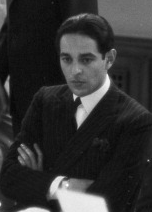Prince Moulay Abdallah of Morocco, KCVO, (31 May 1935[1] – 20 December 1983) was the brother of Moulay Hassan, later King Hassan II of Morocco and the son of King Mohammed V of Morocco (1909–1961) and his second wife, Lalla Abla bint Tahar (1909–1992).
| Prince Moulay Abdallah | |
|---|---|
 Prince Moulay Abdallah in March 1963, during a meeting with Ahmed Ben Bella | |
| Born | 31 May 1935 Rabat, Morocco |
| Died | 20 December 1983 (aged 48) Rabat, Morocco |
| Burial | |
| Spouse | Lamia Solh (m. 1961–1983; his death) |
| Issue | Prince Moulay Hicham Princess Lalla Zineb Prince Moulay Ismail |
| Dynasty | Alaouite |
| Father | Mohammed V of Morocco |
| Mother | Lalla Abla bint Tahar |
| Religion | Islam |
Biography edit
Prince Moulay Abdallah was born at Dar al-Makhzen in Rabat. Like his brother, the future Hassan II, he followed his education at the Royal College in Rabat, created for them in 1942 by their father.[2] The exile of his family in 1953, first to Corsica and then Madagascar, made him change schools. His father and his family lived in Antsirabe and Moulay Abdallah was an intern at a religious college, Les pères jésuites de Saint-Michel.[3] He did not bear boarding school for long, just like his sister Lalla Malika interned in another establishment, and very quickly left this establishment to take private lessons, his sister too.[3] After his family returned from exile in Morocco on November 16, 1955, he returned to his former life and his country became independent on March 2, 1956. He continued his education at l'École des Roches,[4] in Normandy, from the start of the September 1956 school year to obtain his baccalaureate.[4] He left this establishment and enrolled in Paris at the Lycée Louis-le-Grand[5] where he obtained his baccalaureate in 1958.[5] Moulay Abdallah then pursued studies in law at Sorbonne University, and thereafter graduated with a bachelor degree in law in Switzerland.[5]
Family edit
On November 9, 1961, (during a double wedding ceremony alongside his brother Hassan II) he married Lamia Solh, the daughter of Riad Solh, the first Prime Minister of Lebanon.[6][7] His wife henceforth Lalla Lamia was granted the title of Princess and the predicate of Her Highness by King Hassan II.[8] The couple are parents of:
- Prince Moulay Hicham;
- Princess Lalla Zineb;
- Prince Moulay Ismail.
Their children are cousins of Prince Al Waleed bin Talal of Saudi Arabia,[9] whose mother is their aunt Mona Solh.[10]
Death edit
He died of cancer on 20 December 1983, aged 48, in Rabat. He was buried alongside his father, King Mohammed V, in the Mausoleum of Mohammed V in Rabat. Later, it also became the place of burial of his brother King Hassan II.
Legacy edit
Prince Moulay Abdellah Stadium was named after him.
Honours edit
National honours edit
- Knight Grand Cordon of the Order of the Throne (1963).[citation needed]
Foreign honours edit
- France : Knight Grand Cross of the Legion of Honour (1963).[citation needed]
- Empire of Iran : Commemorative Medal of the 2500th Anniversary of the founding of the Persian Empire (14/10/1971).[11]
- United Kingdom : Knight Commander of the Royal Victorian Order (27/10/1980).[citation needed]
References edit
- ^ Legum, Colin (1962). Africa; a Handbook to the Continent. Praeger. p. 47.
- ^ Howe, Marvine (2005-06-30). Morocco: The Islamist Awakening and Other Challenges. Oxford University Press. p. 77. ISBN 978-0-19-534698-5.
- ^ a b Dalle, Ignace. Hassan II:Entre tradition et absolutisme (PDF) (in French). p. 64.
- ^ a b Paris-match (in French). Paris-Match. 1956. p. 62.
- ^ a b c Alaoui, Moulay Hicham. Journal d'un prince banni:Demain, le Maroc (PDF) (in French). p. 15.
- ^ "magazine picture - 1961 - morocco moulay abdallah king hassan II wedding". eBay. Retrieved 2023-09-26.
- ^ ROYAL WEDDING Morocco: Prince Moulay Abdallah & Lamia Solh of Lebanon - 1961 | Rare Footage, retrieved 2023-09-26
- ^ "Discours de Son Altesse La Princesse LALLA LAMIA ESSOLH – O.A.P.A.M" (in French). Retrieved 2023-09-10.
- ^ Samir Bennis (3 April 2019). "The Moroccan-Saudi Rift" (PDF). Al Jazeera Centre for Studies. Retrieved 7 October 2020.
- ^ Fandy, Mamoun (2007-05-30). (Un)Civil War of Words: Media and Politics in the Arab World. Bloomsbury Publishing. p. 43. ISBN 978-1-57356-773-2.
- ^ Badraie Archived 2016-03-05 at the Wayback Machine